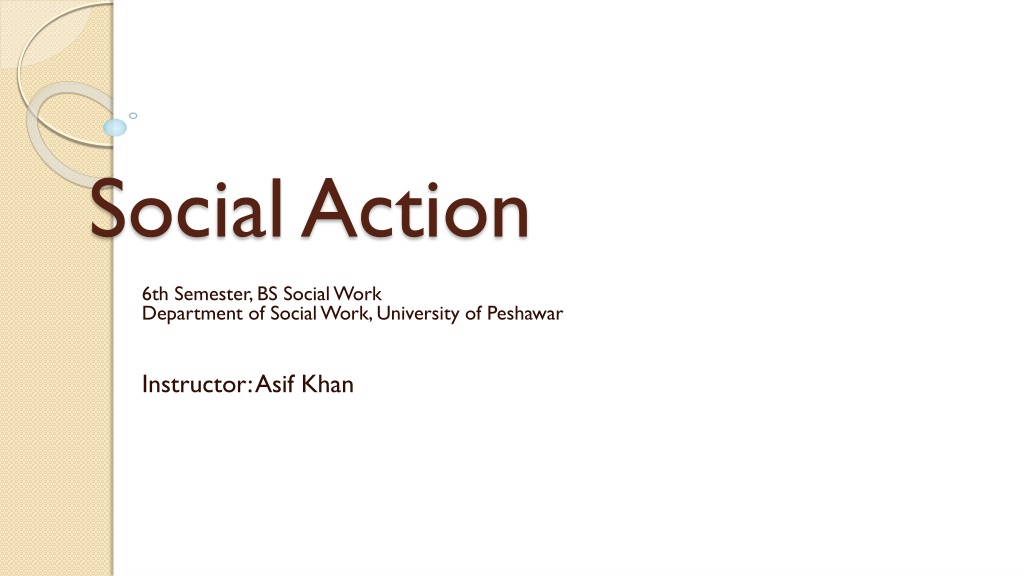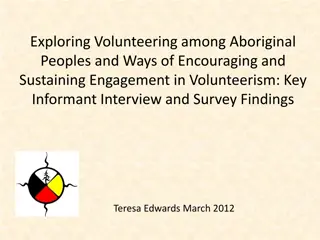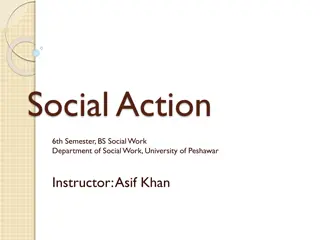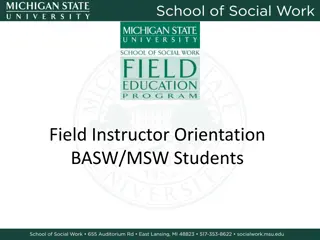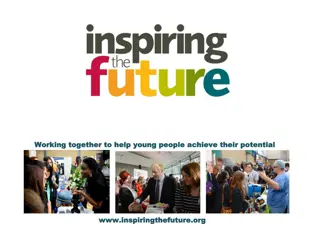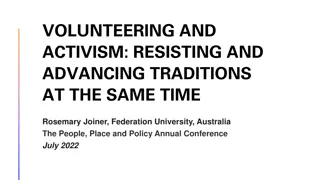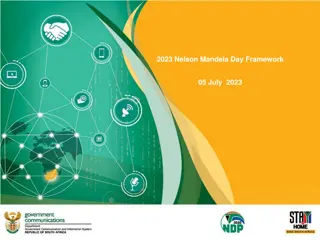Exploring Volunteerism and Social Action in the Field of Social Work
Volunteerism plays a crucial role in community development and societal improvement. This article dives into the significance of volunteer work, its impact on local and national capacity development, and the selfless dedication of individuals working towards the common good. Through examples and definitions, the essence of volunteerism as a noble endeavor for the betterment of society is highlighted.
Download Presentation

Please find below an Image/Link to download the presentation.
The content on the website is provided AS IS for your information and personal use only. It may not be sold, licensed, or shared on other websites without obtaining consent from the author. Download presentation by click this link. If you encounter any issues during the download, it is possible that the publisher has removed the file from their server.
E N D
Presentation Transcript
Social Action 6th Semester, BS Social Work Department of Social Work, University of Peshawar Instructor: Asif Khan
Introduction 1. Volunteerism 2. Social Mobilization 3. Advocacy 4. Lobbying 5. Propaganda 6. Bargaining 7. Blogging 8. Signature Campaign
1. Volunteerism There is no "I" in Team but there is a "u" in volunteer! And There is no "I" in Team,but we sure are glad there is "u" in our volunteers! DebbieWeir Everyday across the globe, millions of people are involved in a uncountable of activities as health workers, in construction, as care assistants, as social activists, and in a gathering of other direct activities to strengthen their communities and the civil society in which they live. The common factor shared by all types of volunteers is a commitment by the individual to the common or public good, in that they work not merely for their own interests but for the benefit of others.
Contd. The scale of volunteering worldwide crosses cultures and political systems and makes it one of the most powerful elements in development and relief. But despite the major contribution of volunteerism to development, it has yet greater available potential for local and national capacity development.
Meaning of Volunteer The word Volunteer , comes from the Latin word valo or velle ,meaning hope,determination,or willingness . In the western countries, people believe volunteers are the ones who work not for personal benefits, nor are they forced by law to labor, but work for free to improve society and provide charity to others. The majority of volunteers in some countries are engaged in social and welfare services under local government administration. According to the American Social Work Board,a group of people who are willing to work together to pursue public benefits are called voluntary groups; individuals who participate in the work of these groups are called volunteers; and this kind of group work is called voluntary service.
Contd. Volunteering is the practice of people working on behalf of others or a particular cause without payment for their time and services. Volunteering is generally considered an noble activity, intended to promote good or improve human quality of life, but people also volunteer for their own skill development, to meet others, to make contacts for possible employment, to have fun, and a variety of other reasons that could be considered self-serving. Volunteering takes many forms and is performed by a wide range of people. Many volunteers are specifically trained in the areas they work in, such as medicine, education, or emergency rescue. Other volunteers serve on an as-needed basis, such as in response to a natural disaster or for a beach-cleanup.
Contd. The Volunteer Association of China puts forward this definition of volunteers: People who are willing to provide services or assistance to society or to others, not for material gains, but from a sense of ethics, faith and responsibility. In China, they have different names in different places for volunteers. In Hong Kong we call them YI GONG (workers of duty) , and in Taiwan we call them ZHI GONG (workers of will) .Today,in China, the development of voluntary services has become a symbol of civilization and social progress. Volunteers can be found in every walk of our lives.
What then are the voluntary services? Some people believe that the good deeds in our daily lives are voluntary services. Others think that a simple donation of money without physical or emotional involvement cannot be defined as voluntary service. Voluntary services are non-profit and non-remunerative efforts which individuals make for the purposes of improving the welfare of others in t h e neighborhood,the community and in society.
Contd. The United Nations has played a particularly significant role through the adoption of volunteering. The first in 1985 invited governments to observe 5th December each year as an International Volunteer Day for Economic and Social Development and the second in 1997, sponsored proclaimed 2001 the International Year of Volunteers. Both resolutions noted the critical role of governments in supporting and encouraging volunteering. specific resolutions on by 126 countries,
Features of voluntary services 1.They are actions for others freely given.Voluntary service is provided by individuals out of loving hearts. People choose to work for the good of others, free of any compulsion by a third party or outside powers. 2. They are contributions that are non-money-rewarding. People give of their time, skills, resources and kindness to provide assistance to their neighbors, communities and society,without expectation of receiving payment. 3. They are initiated by caring hearts. People help others to create a better society.
Values of the Volunteerism Values associated with volunteerism which can reinforce capacity development include the following: 1. Commitment and solidarity. 2. Value-based programmes. 3. Belief in collective action for the public good. 4. Commitment to human rights and gender equity.
Many people are willing to participate. Why? Spiritual Hunt: A person s value shall be decided by what he contributes, not by what he obtains, said Albert Einstein. When volunteers contribute of themselves, they feel they are needed and subsequently rewarded by the praises of others. This is not money, nor material reward, but an internal spiritual value. It gives meaning to life, fills society with warmth and kindness, and encourages volunteers to devote themselves to these activities. Social Mission: Voluntary service originates from charity donation. Today s volunteers carry forward this mission and actively respond to the calling. In many ways they devote themselves to this work and blessings to others around. When volunteers work for the public interest, they not only contribute themselves, but they also establish an active interaction with society.They stimulate people s sense of duty to society. When they demonstrate a spirit of humanism and service, they also help reduce responsibilities of the government, solve social problems, and they are in fact changing society. Again as Albert Einstein said, Only in devoting oneself to serving society, human being will discover the meaning of his short and risky life. 1. 2.
Contd. 3. Knowledge Learning: When a volunteer serves, he/she is not only helping others, but also learning new knowledge and skills. This will help them mature and build good character. Voluntary service is team work. In the team, volunteers learn how to establish good relationships with others, as well as how to strengthen a spirit of teamwork and effective team coordination. This is especially helpful among young volunteers because they can improve their professional skills in the process of learning good teamwork. They will know society better, understand the theories (which they learned from University) better, and also receive inspiration and education. Today s voluntary service is becoming more professional and more formal. Before beginning their work of service, volunteers have to receive formal training. This is a very comprehensive improvement in the quality of voluntary service. important aspect toward a
Contd. 4. Self - fulfilling Values: The famous American psychologist Abraham H.Maslow believed that the ultimate goal of life is self fulfillment.In his definition,self-fulfillment includes caring others and going beyond oneself. Though people seek material gains in their daily lives, their hearts never stop seeking a mere fulfilling sense of personal goodness. To fulfill one s spiritual needs, to pursue higher personal spiritual level, to develop one s potentials and to fulfill personal values are continuous goals of volunteers. Voluntary work not only makes their lives meaningful, also satisfies their spiritual needs and fulfills their personal goals for doing something valuable in life.
Contd. 5. Life Experience Enhancement: Different experiences make our lives colorful. Voluntary service, even if it is of short duration, can be delightful and beautiful. Some volunteers have tasted much of the spice of life, and at the same time have received the experience of a life time. The teachers who participated in the Supporting Rural Area Education Program said, We are touched by the villagers and the villagers also touched us. As volunteers, they felt deeply the heart-to-heart communication. In order to broaden their sense of life experience and build a more meaningful life, more and more people are joining the team of volunteers.
2. Social Mobilization Mobilization a Military terminology, To Mobilize forces for action . Where as Social Mobilization can be defines as A process of motivating communities to organize in a cohesive group for an active participation towards their own development. An integrative process where stakeholders are stimulated to become active participants in social change, using diverse strategies to meet shared goals. Social mobilization in UNICEF is a process that engages and motivates a wide range of partners and allies at national and local levels to raise awareness of and demand for a particular development objective through face-to-face dialogue. = prepare
Contd. Social mobilization is the cornerstone of participatory approaches in rural development and poverty alleviation programmes. It is a powerful instrument in decentralization policies and programmes aimed at strengthening human and institutional resources development at local level.Social mobilization strengthens participation of rural poor in local decision-making, improves their access to social and production services and efficiency in the use of locally available financial resources,and enhances opportunities for asset-building by the poorest of the poor.
Contd. Social mobilization is the primary step of community development for recovery from conflicts and disasters. It allows people to think and understand their situation and to organize and initiate action for their recovery with their own initiative and creativity. Through mobilization, people can organize themselves to take action collectively by developing their own plan and strategy for recovery rather than being imposed from outside.
Tools of Social Mobilization The following are some of the tools of Social Mobilization: 1. Social networks 2. Collaborative working groups 3. Newsletter 4. Mailing List and SMS 5. Blogs 6. Petitions and Surveys 7. Videos 8. Individual Stories
Main Approaches of Social Mobilization 1. Political Mobilization: an approach which aims at winning political and policy commitment for major goal and the necessary resource allocations to realize that goal 2. Government Mobilization: aims at provoking the cooperation of service providers and other government organizations which can provide direct or indirect support to the program. 3. Community Mobilization: aims at gaining the commitment of local political, religious, social, and traditional leaders, as well as local government agencies, non-governmental organizations (NGOs), women s groups and cooperatives.
Contd. Tips On Community Mobilization 1. Know your community well, and understand their problems and their needs. 2. Always listen to community members carefully. 3. Do not rapidly introduce new interventions that are different from existing practices and beliefs. Take gradual steps to introduce such practices. 4. Try to analyze community dynamics and adjust to each situation. 5. Involve the entire community in the program right from the beginning 6. Give respect and importance to negative experiences of the community, if any, and try to minimize the negative feelings verbally and in your actions.
Contd. 4. Corporate Mobilization: aims at securing the support of national or international companies in promoting development goals, either by contributing needed resources or carrying out the advertising function. Corporate Social Responsibility (CSR) Refers to operating a business in a manner that accounts for the social and environmental impact created by the business. commitment to developing policies that integrate responsible practices into daily business operations reporting on progress made toward implementing these practices.
Contd. 5. Beneficiary Mobilization: involves informing and motivating the program beneficiaries through trainings, establishment of community groups, and communication through traditional and mass media.
3. Advocacy Advocacy has originated from a Latin word: Ad means on behalf of ; voca means to express / talk . Advocacy can be defined as the practical use of knowledge for purposes of social changes. These changes can be directed to government policies, laws, procedures, or sometimes to ourselves. Advocacy is therefore an act of supporting an issue and influence the decision makers on how to act in order to support that issue.This definition tells,in fact,that advocacy is a process, not an one-way activity. By this definition it is clear that advocacy is an effective process aimed at achieving some specific results.
Contd. Advocacy is about motivating and mobilizing the community. It starts with a small group of people who share concerns about a specific problem and are willing to devote time, their expertise and resources available to reach the desired change. Advocacy means:Drawing attention to an important issue and direct decision-makers to a solution.Influencing the decision-making at all levels. Mobilizing members of the community, to include the wider community. Developing accountability and transparency of local governments and public services/institutions. Advocacy is speaking up for, or acting on behalf of, yourself or another person.
Why Advocacy To strengthen democracy and inculcate in society, the values of the Constitution Freedom Equal Rights, Equal Justice and Equity Development of society, progress and change society Equity, Freedom and Brotherhood Social, Economic, Cultural and Political change To empower the Marginalized the voice of the voiceless, and influence policy decision. Influence policy change, policy and implement policy. Disseminate information about Policies, Programmes: Enhance skills in people Government agencies and schemes. 1. 2. 3. 4. 5. 6.
4 Cs of Advocacy 1. Connection 2. Context 3. Commitment 4. Catapult (Project)
Success of Advocacy depends on 1. Skills 2. Experience 3. Detailed study 4. Knowledge of laws 5. Vision 6. Ability to mobilize people
Characteristics of Advocacy 1. Questionnaire -demands in political domain 2. Voice against exploitation, injustice 3. Empowerment of the marginalized 4. Pro-people policy demand 5. Enhance peoples strength 6. Develop relevant strategy
Steps involved in Advocacy. 1. Identify Issue define the question Long / Short Term 2. Gather Information: a. Related laws regarding issues b. Government policy c. Others like Minded Individuals / N.G.O.s d. Relevant Government Officials / Departments 3. Plan of Action 4. Involvement of Media: a. Relationship with press b. Press Conference / Press Release
Contd. 5. Meeting the Government Officers: Make Friends b. Speak to the Point c. Don t be Emotional d. The fight is not against person, but position a. 6. Meetings Elected Representatives: a. Village Level b. District Level a. c. State Level a. Make Friends b. Be focused on few points c. Listen carefully
Advocacy can be divided in three types of activities, including: 1. Representation: speaking on behalf of the voiceless (for) 2. Mobilisation: encouraging others to speak with you (with) 3. Empowerment: supporting the voiceless to speak for themselves (by)
Types of advocacy There are many different types of advocacy, including: 1. Self Advocacy 2. Group Advocacy 3. Peer Advocacy 4. Citizen Advocacy 5. Professional Advocacy
Contd. 1. Self Advocacy: Self-advocacy refers to an individual s ability to effectively communicate his or her own interests, desires, needs and rights. It recognises that people are experts by experience and involves them in speaking out for themselves about the things that are important to them. It means that people are able to ask for what they want and need and to tell others about their thoughts and feelings. The goal of self-advocacy is for people to decide what they want and to carry out plans to help them get it. Self-advocacy differs from other forms of advocacy in that the individual self-assesses a situation or problem and then speaks for his or her own needs. The ultimate aim of all forms of advocacy should be to support people to self-advocate as far as they are able to.
Contd. 2. Group Advocacy: Group advocacy involves people with shared experiences, positions or values coming together in groups to talk and listen to each other and speak up collectively about issues that are important to them. These groups aim to influence public opinion, policy and service provision. They vary considerably in size, influence and motive. 3. Peer Advocacy: Peer advocacy refers to one-to-one support provided by advocates with a similar disability or experience to a person using services. Trained and supported volunteers often provide peer advocacy as part of a coordinated project. Peer advocacy schemes argue that they are particularly well placed to understandings with the needs of people, to approach them as their equals and to feel strongly about, and fight hard for, their needs.
Contd. 4.Citizen Advocacy: Citizen advocacy aims to involve people in their local community by enabling them to have a voice and to make decisions about the things that affect their lives. Citizen advocacy partnerships are long term, not time-limited, and last for as long as the citizen advocate and the individual want them to. Citizen advocates are ordinary members of the local community. They are unpaid and usually operate with support from a coordinated scheme. 5. Professional Advocacy: Paid independent advocates support and enable people to speak up and represent their views, usually during times of major change or crisis. Such advocacy is issue-based and the advocate may only need to work with the person for a short time.
